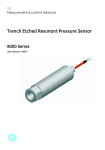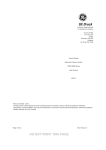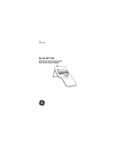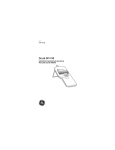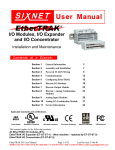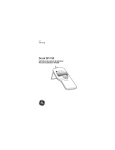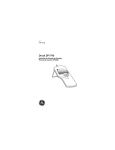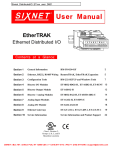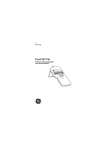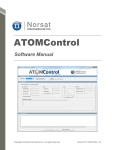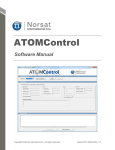Download RPT 301 - GE Measurement & Control
Transcript
GE Sensing RPT 301 Digital Output Pressure Transducer User Manual K177 © General Electric Company. All rights reserved. RPT 301 Digital Output Pressure Transducer User Manual K177 © Druck Limited 1998 This document is the property of Druck Limited and may not, either in part or whole, be copied or otherwise reproduced, communicated in any way to third parties, nor stored in any Data Processing System, without the express written authority of Druck Limited. K177 Issue No. 3 K177 Issue No. 3 RPT 301 User Manual i Safety The manufacturer has designed this instrument to be safe when operated using the procedures detailed in this manual. Do not use this instrument for any other purpose than that stated. Do not apply values greater than the maximum value stated. This manual contains operating and safety instructions that must be followed for safe operation and to maintain the instrument in a safe condition. The safety instructions are either warnings or cautions issued to protect the user and the equipment from injury or damage. Use qualified* technicians and good engineering practice for all procedures in this manual. Pressure Do not apply pressure greater the maximum safe working pressure to the instrument. Electrical Safety This instrument is designed to be safe when using options and accessories supplied by the manufacturer. Toxic Materials There are no known toxic materials used in this instrument. Maintenance The instrument must be maintained using the manufacturer’s procedures and should be carried out by authorised service agents or the manufacturer’s service departments. Technical Advice For technical advice contact the manufacturer or subsidiary refer to section 5.5. * A qualified technician must have the necessary technical knowledge, documentation, special test equipment and tools to carry out the required work on this instrument. K177 Issue No. 3 ii RPT 301 User Manual Abbreviations and Symbols The following abbreviations are used in this manual. Note: Abbreviations are the same in the singular and plural. EMC FS IEC inHg kg/cm2 kPa mA mm NL, H & R PCB psi RPT V VA electromagnetic compatibility full-scale International Electrical Council inch of mercury kilogram per centimetre squared kilo Pascal milli Ampere milli metre non-linearity, hysteresis and repeatability printed circuit board pound per square inch resonant pressure transducer Volt Volt amp The following symbols are used in this manual Hazard, a warning highlighting a danger that would result in injury. Also a marking on the instrument referring the user to this publication. This symbol, on the instrument or in the manual, indicates a static sensitive component. CE This product meets the essential protection requirements of the relevant EEC directives. Further details of applied standards may be found in the product specification. K177 Issue No. 3 RPT 301 User Manual iii Table of Contents 1 1.1 1.2 Introduction ................................... 1 Description ................................................ 1 Specification .............................................. 1 2 2.1 2.2 2.3 Installation ..................................... 4 Mounting the Transducer ......................... 4 Pressure Connection ................................ 4 Electrical Connection ................................ 6 3 3.1 3.2 3.3 3.4 3.5 3.6 Operation ....................................... 11 System Operation ..................................... 11 Command Summary ................................. 11 General Command Format ....................... 13 General Reply Format ............................... 15 Error Message .......................................... 15 Detailed Command Definitions ................ 17 4 Calibration ..................................... 23 5 5.1 5.2 5.3 5.4 5.5 Maintenance .................................. 26 General ...................................................... 26 LED Indicator ............................................ 26 Diagnostic Mode ....................................... 26 Cleaning .................................................... 27 Approved Service Agents ......................... 28 K177 Issue No. 3 iv K177 Issue No. 3 RPT 301 User Manual RPT 301 User Manual 1 1.1 1 Introduction Description The RPT 301 Digital Output Pressure Transducer measures air pressure applied to the connection port and produces an electrical output. It comprises a resonant sensor connected to a printed circuit board to produce a serial digital output and is contained in a metal enclosure to IP65 standard. The instrument is designed to communicate with compatible equipment using a serial communications system which can be selected by the user for either RS232 or RS485 standard communications interface. The power supply for the instrument is a wide tolerance DC voltage with a low power consumption A remote start-up facility enables the instrument to be remotely switched on and off to save power. 1.2 Specification Accuracy Non-linearity, hysteresis and repeatability: Standard ................................................................. ± 0.02% FS Option A .................................................................. ±0.01% FS Temperature affects: ............... ±0.02% FS over operating temperature range Long term stability: Standard ............................................. 150 ppm per 12 months Option A ............................................. 100 ppm per 12 months Ranges .................................................................. 750 to 1150 mbar a .................................................................... 35 to 1300 mbar a .................................................................... 35 to 2620 mbar a .................................................................... 35 to 3500 mbar a Dimensions Weight: ...................................................................................... 0.65 kg Size: ...................................................... 125 mm x 80 mm x 57 mm Environment Operating temperature range ..................................................... -20 to + 60 C Storage temperature range ......................................................... -40 to + 80 C Sealing: ........................................................................................... IP65 K177 Issue No. 3 2 RPT 301 User Manual Power supply Electrical Safety: .......................................... EN61010 (IEC 1010) as applicable Voltage .............................................................. 4.5 to 32 V DC Power .......................... 0.6 Watts at 5 V to 0.75 Watts at 32 V Electromagnetic compatibility ............................................................ EN50081-1 (emissions) ............................................................. EN50082-2 (immunity) Switch on Settling Time: ... Less than 5 seconds (with filtering disabled) Pressure measurement Measurement cycle: ........................................ Fixed, nominally 0.5 seconds Reading Filter: Single pole low pass filter, variable time constant and step response Reading Resolution: ........................ Programmable number of decimal places Data Communications: Serial RS232 or RS485 (selectable) Software or hardware handshaking on RS232 software handshaking only on RS485. Power Control (Remote Start-Up) A floating ‘volt free’ two-wire control input is provided to enable the instrument to be remotely switched on or off. Pressure connection .............................................................................. G1/8 female overpressure ................................... 1.25 x calibrated full-scale pressure containment ................................................... 5 bar a Pressure medium compatibility: ....................... Dry gases compatible with: Glass, Silicon, Titanium, Stainless Steel and Epoxy adhesive Note: Continuing development sometimes necessitates specification changes without notice. K177 Issue No. 3 RPT 301 User Manual 3 Accessories The following items are delivered with the instrument after manufacture. User manual K177 (this publication) Calibration certificate Mating electrical connector (if ordered) K177 Issue No. 3 4 2 RPT 301 User Manual Installation Installation must be carried out by a qualified technician. 2.1 Mounting the Instrument (Figure 2.1) The instrument can be mounted on a vertical surface using two screws or bolts to a maximum diameter of 4 mm. Figure 2-1 Mounting Arrangement 2.2 Pressure Connection The pressure port is a G1/8. If a pipe is connected to this port a bonded seal must be used. The instrument is very sensitive to air movement (small local pressure changes), when the pressure port is directly sensing the atmosphere, the fitting of a filter or restrictor is recommended. K177 Issue No. 3 RPT 301 User Manual 5 Figure 2-2 Instrument Dimensions K177 Issue No. 3 6 2.3 RPT 301 User Manual Electrical Connection The electrical connector is a 10-way connector (MIL C26482) for serial, parallel and power connections. Instrument Connector - Plug, Amphenol 62GB 12E12 - 10P Cable Connector Socket, Amphenol 62GB 16F12 - 10S - Communication connections When configured for: RS485 A B C D E F G H J K = = = = = = = = = = RS232 Power Supply -ve Power Supply +ve Chassis Data out +ve Data out -ve Data In +ve Data In -ve Data Ground Start-Up -ve Start-Up +ve A B C D E F G H J K = = = = = = = = = = Power Supply -ve Power Supply +ve Chassis RTS Input Data Out CTS Output Data In Data Ground Start-Up -ve Start-Up +ve Power supply The instrument is internally fused with reverse polarity and overvoltage protection. Note: The power input is transformer isolated from the logic circuits and the serial data link. The isolation voltage is 50V dc. For continuous operation the ‘Start-up’ connections should be connected to the supply, make sure the polarity is correct and the current requirements are met. When RS232 is used, the RTS line can be connected to the `Start-up' input and the RTS input on pin D so that the control computer can turn on the instrument. K177 Issue No. 3 RPT 301 User Manual 7 The start-up +ve and -ve connections must be connected for the instrument to operate. There are many ways of connecting the start-up facility for example: Power control The current consumed by the instrument is approximately 1 mA at 3 V, 2 mA at 5 V rising to 16 mA at 32 V. If necessary, when using a supply greater than 5 V, a series resistor can be used to reduce the current drain to 1 mA. Connections for remote on/off control current limiting resistor for high supply voltages see text Connections for continuous operation 7 4 Connections for remote on/off control using RS232 output K177 Issue No. 3 8 RPT 301 User Manual Communications The installed instrument is controlled by the serial data interface. Software or hardware handshaking can be used on the RS232 interface and only software handshaking on the RS485 interface. Changing the communication interface standard (Figure 2-3) The communication interface standard is set at manufacture to RS232 but can be changed as follows: Remove the lid of the instrument to gain access to the PCB. CAUTION : THE PCB CONTAINS SENSITIVE ELECTRONIC COMPONENTS. Carefully connect the interface connector lead and the link LK2 in the following positions: RS232 interface lead to PL1 LK2 to position A Refit and secure the lid of the instrument. K177 Issue No. 3 RS485 interface lead to PL3 LK2 to position B RPT 301 User Manual 9 LK1 PL3 LK2 B A B B PL1 Figure 2-3 Changing the communication interface K177 Issue No. 3 10 RPT 301 User Manual Screening Make sure that the chassis connection between the control computer and the instrument is continuous. Use screened cable and bond the cable screening to the connector shell of the instrument and to the computer enclosure. computer screened cable RPT 301 enclosure connect screen to connector shell Screening to ensure EMC performance K177 Issue No. 3 RPT 301 User Manual 3 3.1 11 Operation System Operation The frequency output from the sensor is counted for a fixed number of cycles. A mid-scale pressure gives a measurement period of approximately 0.5 seconds. During this time a high frequency clock is also being counted and at the end of the measuring cycle it is this value which is transferred to the processor for conversion into its pressure equivalent. Measurement cycles are continuous, unless specifically interrupted (see the G command). Each cycle delivers a new pressure value to the programmable filter. The output of this filter is stored in a buffer and may be requested by the control computer or sent automatically at a programmable interval to the control computer. 3.2 Command Summary The instrument has a range of commands summarised in the table and detailed in this section. Some of these commands generate a reply from the instrument, the general format of these replies is given in section 3.4. K177 Issue No. 3 12 RPT 301 User Manual Command Summary Table Command Function Measurement Return stored reading R <CR> * Return stored reading G Get New Reading A Auto send reading X Auto send from power-up Set-up U Set units F Set filter B Set reading resolution O Set communication parameters S Status I Identity User calibration C P CR CRLF User calibration (linearity) Change protection PIN Command Terminators * Short form of the 'R<CR>' command K177 Issue No. 3 RPT 301 User Manual 3.3 13 General Command Format The instrument is controlled by a sequence of single letter commands. Some commands require one or more numeric values to follow the letter, the correct number of parameters must be sent with this type of command. All command fields must be separated by a comma. The instrument accepts upper-case or lower-case letters. Single commands Single commands should be of the form: Command, P1, P2, ,Pn<CT> Where, Command is a single ASCII character, P1 to Pn are numbers in the form: (-) mmm.ddd or (-)m.ddddE(-)xx e.g. 123.456 or 1.23456E02 Example: Single Command <CT> is the command terminator (CR or CRLF) A,3<CR> selects auto-send mode with 3 second period a,3<CRLF> has the same effect Command Strings Commands can be strung together with a separating semicolon. The whole command string is only interpreted and actioned when a valid terminator is received. Example: Multiple Commands (Command String) 1. O, PIN, address, baud, data bits, stop bits, parity, handshake; U, units; P, PIN, New PIN Reply: None This command string sets: port address (00), baud rate, units and new PIN. K177 Issue No. 3 14 RPT 301 User Manual 2. U, O; G; R; G; R; U, 16; G; R; G; R; G; R; A, 100 Reply: Reading 1 mbar Reading 2 mbar Reading 3 psi Reading 4 psi Reading 5 psi Then at 100 second intervals - Reading psi This command string sets the instrument units to mbar, returns two consecutive readings, changes units to psi, returns three consecutive readings and then selects auto-send mode with a period of 100 seconds between readings. Command String Limitations Auto-send mode and diagnostics mode are cancelled when a further command is received, this should be used at the end of a command string. Note: K177 Issue No. 3 The C, L and T commands are interactive and are not suitable for multiple commands. RPT 301 User Manual 3.4 15 General Reply Format For commands that have a reply string, the reply terminator <RT> is always transmitted and is always <CR> followed by <LF>. <RT> is expected with all commands but only shown in some of the following sections for clarity (e.g.: Section 5.3 Diagnostics Mode). Command Terminator Command strings must end with the command terminator <CT>. For Dumb Terminal applications press the carriage return (or enter) key. With a Terminal Emulator communications application, the application must be set-up to give the required output when the carriage return (or enter) key is pressed. For Custom applications, <CR> (decimal 13) or <CRLF> (decimal 13 followed by decimal 10) must be added to the end of each complete command string. <CT> is expected with all commands except for some interactive commands where further explanation is necessary (e.g.: Section 4 User Calibration). 3.5 Error Message Error messages are generated from two sources: a. The command decoder. A command error causes the return of an error message and stops the rest of the command string. The instrument sends an error message corresponding to the command error. b. A pressure sensor fault causes an error message to be sent. Serious faults block the transmission of pressure data and sends the error message in place of data. K177 Issue No. 3 16 RPT 301 User Manual Error Message Format The form of the error message: ERROR nn - where nn is a decimal number Defined error numbers are: 01 - Bad command 02 - Bad password 04 - Bad data detected by checksum 08 - Data out of range 16 - Hardware fault 32 - Pressure outside range 64 - System not ready Error messages are sent when an error is detected. Example When first detected the hardware fault error is sent once even though the fault persists, sending the S (status) command provides further details of the fault. K177 Issue No. 3 RPT 301 User Manual 17 3.6 Detailed Command Definitions Measurement Commands R - Return stored reading This command retrieves the current stored reading, as the reading is the stored and filtered (if the filter is selected) there will be no delay in the reply. Command: R Reply: nnnnnnn<SP>UNITS Where: ‘nnnnnnn’ is the stored reading as a floating point number ‘Units’ are the units for nnnnnnn (i.e. mbar, mH2O, psi etc.) G - Get reading This command initiates a new measuring cycle. The reading is not returned by this command, string ‘G’ and ‘R’ together to return the reading (i.e. G;R<CR>). The instrument proceeds to the next command after the end of the measurement cycle (see specification for duration) or in the event of a reading failure (fault condition) after a time-out of approximately 2 seconds. The command synchronises the measurement cycle with an external event. Note: Use of the G command overrides any filter that has been selected. The reading obtained is passed without filtering to the reading store. Command: G Reply: None Result: Initiates new measurement cycle A - Auto send reading This command places the instrument into a mode where the value currently held in the reading store is sent to the control computer with a specified interval between each transmission. Auto send is terminated by any following command. K177 Issue No. 3 18 RPT 301 User Manual Command: A,nnnnnn Where: ‘nnnnnn’ is a number between 1 and 999999. This is the period in seconds between successive transmissions. Reply: None Result: A reading is transmitted every nnnnnn seconds. The transmission format is the same as the reply of the ‘R’ command. X - Auto Send from switch-on The ‘A’ command is cancelled by any following commands and is not restored at switch-on. If the pressure transducer continuously sends readings and does so even after power failure, (this includes using the ‘shutdown’ facility) then the ‘X’ command can be used to select this facility. This command allows a transmission period to be stored in nonvolatile memory which will be automatically loaded and actioned as if the ‘A’ command had been sent at switch-on. Command: X,nnnnnn Where: ‘nnnnnn’ is a number between 0 and 999999. This is the transmission interval in seconds as for the ‘A’ command. A value of 0 disables the Auto send at switch-on. Reply: None Result: Instrument powers up in auto-send mode with the selected transmission interval. K177 Issue No. 3 RPT 301 User Manual 19 Set-up Commands U - Unit Set-up This command sets the units of the pressure measurement; the selection is nonvolatile. Command: U,nn Where: ‘nn’ can be up to two digit number taking one of the following values: * 0 - mbar 13 - mH20 1 - Pa 14 - torr 2 - kPa 15 - atm 3 - MPa 16 - psi 4 - hPa 17 - lb/ft2 5 - bar 18 - inHg 6 - kg/cm2 19 - inH2O04 7 - kg/m2 20 - ftH2O04 8 - mmHg *21 - mbar 9 - cmHg 22 - inH2O20 10 - mHg 23 - ftH2O20 11 - mmH2 O *24 - mbar 12 - cmH2O * Note: mbar can be selected using code 0, 21 or 24. Reply: None K177 Issue No. 3 20 RPT 301 User Manual F - Filter Set-up This command sets the instrument reading filter coefficients. Command: F, step, average Where: step is a pressure band within which the filter operates. If the pressure steps outside this band, the filter is bypassed. This gives an unfiltered response to non-noise step changes. step takes a value expressed as a percentage (0 100%) of full-scale. If step = 0 then the filter is disabled. average is the number of sequential readings (1 99) averaged by the filter. High values effectively give the filter a long time-constant. Reply: None B - Set Resolution This command enables the decimal place of the reading to be adjusted within the instrument’s resolution, see specification. The reading resolution is automatically selected according to the instrument fullscale and the units that have been selected using the units set-up command. An algorithm is used that gives a resolution which does not interfere with the accuracy of measurement and is as noise-free as possible before filtering. The set resolution command allows the number of decimal places of the transmitted value to be specified, this overrides the automatic selection of resolution for the current selected units. Changing units cancels any previous set resolution command. The command is nonvolatile and remains selected until the units are changed. Changing and restoring the units can be used to cancel the set resolution command. Command: B,n Reply: None Result: Sets the transmitted number of decimal places to be ‘n’ 0-5 max depends on units resolution. K177 Issue No. 3 RPT 301 User Manual 21 O - Set Communications Options This command sets the communication port parameters to match those of the control computer. Note: When changing these settings care must be taken to avoid losing communication with the instrument. If this should happen the default communications settings can be restored (those operational at the time of shipment) by moving Link 1 to the ‘A’ (Restore) position and switching the power off and back on. The link should then be moved back to the ‘B’ (Normal) position. If the link is left in the ‘A’ (Restore) position it is not possible to permanently change the communications settings; this may be considered useful in some applications. Default on shipment is set to the command O, 000,00,0,0,0,0,0 which means: 9600 baud, 8 data bits, 2 stop bits, no parity, no handshake. Command: O, PIN, address, baud, data bits, stop bits, parity, handshake Where: PIN is a three-character password = 000 - 999 address always = 00 baud rate value = 0 - 7: 0 = 9600, 1 = 4800, 2 = 2400, 3 = 1200, 4 = 600, 5 = 300, 6 = 150, 7 = 75 data bits: 0 for 8 data bits1 for 7 data bits stop bits: 0 for 2 stop bits parity: 0 = no parity handshake: 0 = no handshake 1 for 1 stop bit 1 = even parity 2 = odd parity 1 = software handshake (XON/XOFF) 2 = hardware handshake (RTS/CTS) Reply: None Note: When RS485 hardware has been selected the serial link is configured as full duplex with no hardware handshaking. Handshake = 2 is not valid for RS485 hardware. K177 Issue No. 3 22 RPT 301 User Manual S - Status This command returns the instrument status. Command: S Reply: STATUS nn Where nn: 01 = Frequency outside limits 02 = Diode voltage outside limits 04 = Electronics failure Combination errors: Result: a status 06 represents diode voltage and electronics failure. no change I - Identity This command requests the unit to send items of data which describe the unit identity. Command: I Reply: type, range, S/N, cal date Result: No change in status or operation Where: Type = Range = S/N = Cal date = Command: Equipment model (Druck RPT 301) Pressure range, lower and upper and pressure type Transducer serial number Date of last calibration I,S/PIN, Name Value<CR> format i. When Name = S, Value = nnnn/yy-mm Reply: S/N = nnn/yy-mm Result: sets displayed serial number ii. When Name = H, Value = nnnn Reply: HIGH RANGE = nnn mbar Result: sets displayed highest operating pressure (mbar) iii. When Name = L, Value = nnnn Reply: LOWEST RANGE = nnn mbar Result: sets displayed lowest operating pressure (mbar) K177 Issue No. 3 RPT 301 User Manual 23 4 Calibration The instrument is supplied with a calibration certificate. For the instrument to stay accurate it is recommended that it is checked every 12 months. The use of a Class A compensated deadweight pressure standard is recommended. The following procedures should be carried out in a controlled environment by qualified personnel. If the accuracy of the instrument is not within the specification, carry out a calibration adjustment procedure. A qualified person must have attended a product training course given by the manufacturer or appointed agent and successfully completed the training course on this equipment. The manufacturer offers a comprehensive and, if required, NAMAS accredited calibration service. Calibration Check A calibration check should be carried out at chosen intervals. The readings of the instrument should be compared with a pressure standard and, after any adjustments for accuracy (traced to National Standards), the differences recorded. The adjusted differences can then be compared with the required accuracy for the instrument. If necessary a calibration adjustment can be carried out. The recommended procedure is to check at increasing and then decreasing intervals of 0, 20, 40, 60, 80 and 100% of full-scale. C - User Calibration (Linearity/Drift Compensation) This command performs a `best straight line fit' to the remaining errors of the transducer or does a single pressure point correction. Entering one pressure point causes the offset between the transducer and the pressure standard to be added/subtracted across the whole pressure range. Entering two pressure points (near zero and near full-scale) cancels zero and full-scale drift. Entering more pressure points reduces the remaining non-linearity and makes the zero and full-scale correction more accurate. K177 Issue No. 3 24 RPT 301 User Manual The calibration routine requires a minimum of two pressures within the operating extremes (maximum of six pressures). The instrument software calculates an offset and gain correction to be applied to all subsequent readings using a statistical best straight line method. For single point calibration, the gain factor is set to unity. Notes 1 For the pressure sensor to rapidly respond to the applied pressure, disable the filter by sending the filter command F, 0,0<CR>. 2 Before sending the ‘C’ command set the instrument to operate in the pressure measurement units required for calibration. i.e. U, 0<CR> selects mbar. Always use the same units when entering applied pressures. Command: C, PIN Reply: APPLY PRESSURE nn apply pressure, when steady send <CT> ENTER APPLIED PRESSURE nn type pressure value - decimal number followed by Reply: <CT> Reply: MORE? (Y/N) type Y <CT> to calibrate more points or type N <CT> to complete calibration point entry SLOPE XX INTERSECT YY ACCEPT CALIBRATION (Y/N) type Y <CT> to accept and permanently update the calibration Reply (if N): or Reply (if N): Reply (if Y): Reply: K177 Issue No. 3 type N <CT> to terminate without saving CALIBRATION TERMINATED end of calibration procedure ENTER CAL DATE type date in the format DD/MM/YY CALIBRATION COMPLETE Where:nn = pressure point 1-6 RPT 301 User Manual 25 P - Change PIN This command changes the PIN (Personal Identification Number) that protects the calibration data. The instrument is shipped with the PIN 000. If the PIN is lost, the default (000) may be restored by fitting the ‘default’ link and switching off and then on. Note: Restoring the defaults restores ALL of the factory settings including the communication parameters. Command: P, PIN, New PIN Where: PIN is the existing 3-digit code (000 to 999) and New PIN is the replacement PIN. Reply: None Result: PIN is replaced by New PIN K177 Issue No. 3 26 RPT 301 User Manual 5 Maintenance 5.1 General User maintenance on this instrument is limited to checking the LED indicator, a diagnostic mode and cleaning the case. 5.2 LED Indicator With the lid of the instrument removed, an LED located on the PCB flashes when a pressure conversion is carried out. This indicates that the instrument has power, that the processor is functioning and the transducer frequency and diode voltage are within normal limits. 5.3 Diagnostic Mode D - Diagnostic Mode This command places the instrument into the diagnostic mode. Command: D, mode Where: mode is a single digit: 1 2 3 4 5 Dump all 512 stored values. Dump transducer coefficients (checks LOAD L command). Dump calibration factors i.e. gain, offset etc. Continuous output of sensor diode voltage (temperature) mV. Continuous output of sensor frequency in Hz. Result: The reply depends on the mode as follows: Mode 1 32 lines of output as follows: aaa - nn nn nn nn nn nn nn nn nn nn nn nn nn nn nn nn<RT> where: aaa = hexadecimal address offset (0 to 1FFH) and nn = hexadecimal data K177 Issue No. 3 RPT 301 User Manual 27 Mode 2 “K00”,Coeff 1<RT>...”K55",Coeff 25<RT>, ”KX”,Coeff X<RT>, ”KY”,Coeff Y<RT>, “CS”,RPT barometric checksum<RT>, “SN”,RPT serial number<RT>, “RH”,RPT max. operating pressure (mbar)<RT>, “LH”,RPT min. operating pressure (mbar)<RT>, “TYPE”,RPT type<RT> Mode 3 Frequency constant, pressure gain, pressure offset, diode volts offset Mode 4 DIODE = value - For every reading where value is the diode voltage in mV Mode 5 FREQUENCY = value - For every reading Where: ‘value’ is the sensor frequency measured in Hz * 5.4 Modes 4 and 5 are cancelled by any other command. Cleaning Clean the external case of the instrument with a damp lint-free cloth and mild detergent. Make sure that there is no debris in the pressure port. K177 Issue No. 3 28 5.5 RPT 301 User Manual Approved Service Agents Find approved agents for the servicing of Druck Instruments at: www.gesensing.com K177 Issue No. 3




































